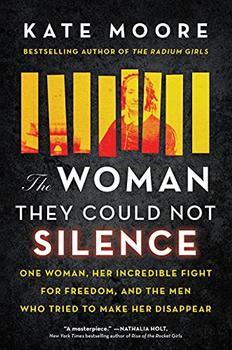Summary | Excerpt | Reading Guide | Reviews | Beyond the Book | Readalikes | Genres & Themes | Author Bio

One Woman, Her Incredible Fight for Freedom, and the Men Who Tried to Make Her Disappear
by Kate Moore
In all their years together, however, he had never before rifled through her things at night. Fortunately, he was so engrossed in his task he did not see her. Elizabeth slipped back to bed, her sharp mind whirring, reviewing the events that had led them to this point.
The Packards had married in 1839 when Elizabeth was a "green" twenty-two and Theophilus a "dusty" thirty-seven. Theirs had been a clumsy, awkward courtship, throughout which Elizabeth feared her curt fiancé, fifteen years her senior, "did not seem to love me much." But as Theophilus was a long-time colleague of her father and Elizabeth an obedient daughter, she'd married "to please my pa," committing herself to her new husband "with all the trusting confidence of woman."
At first, all had seemed well. Elizabeth had been raised "to be a silent listener" and her preacher husband contentedly became the sole mouthpiece in their marriage. "To make him happy was the height of my ambition," Elizabeth wrote. "That's all I wanted—to make my husband shine inside and out."
The problem in their marriage had been he didn't make her shine in return. Their characters were as opposite as it was possible to get. Where Elizabeth was vibrant, sociable, and curious, Theophilus was gloomy, timorous, and—in his own words—"dull." A typical diary entry of his read: "This Sabbath is the commencement of spring. Rapidly do the seasons revolve. The spring-time of life is fast spending. Soon the period of death will arrive." No wonder Elizabeth described their marriage as "cheerless." She wrote with feeling: "The polar regions are a terrible cold place for me to live in, without any fire outside of me." Her husband seemed "totally indifferent" to her. Sadly, she concluded that he did "not know how to treat a woman."
Nevertheless, she said nothing to him directly, enduring this "blighting, love strangling process silently, and for the most part uncomplainingly."
That is...until everything changed. In 1848, the first Woman's Rights Convention was held in Seneca Falls, New York, unleashing a national conversation about the rights of women. It was one in which Elizabeth and, less willingly, Theophilus took part. "Wives are not mere things—they are a part of society," Elizabeth began to argue, but Theophilus's belief, according to his wife, was that "a woman has no rights that a man is bound to respect."
Countless times, the couple had "warm discussion[s]" on the subject. It was Elizabeth, naturally blessed with "a most rare command of language," who triumphed in these fights. Yet her victories came at a cost. She felt the demonstration of her intellect prompted "jealousy...lest I outshine him." Theophilus was "stung to the quick," and his grievances slowly grew. He was the kind of man who counted them like pennies, recording slights in his diary with the miserly accuracy of a rich man unwilling to share his wealth. He grumbled crossly, "My wife was unfavorably affected by the tone of society, and zealously espoused almost all new notions and wild vagaries that came along."
Perhaps the notion that caused him most consternation: in Elizabeth's words, "I, though a woman, have just as good a right to my opinion, as my husband has to his."
The concept was dazzling. "I have got a mind of my own," she realized, "and a will, too, and I will think and act as I please."
Elizabeth's newfound autonomy was anathema to Theophilus. "Wives, obey your husbands" became a scriptural passage oft quoted in their home. But Elizabeth was no longer silently listening. She felt that Theophilus might, "with equal justice, require me to subject my ability to breathe, to sneeze, or to cough, to his dictation, as to require the subjugation of my...rights to think and act as my own conscience dictates." Defiantly, she kept on articulating her own thoughts, asserting her own self, inspired by the women's rights movement that it was her right to do so.
Excerpted from The Woman They Could Not Silence by Kate Moore. Copyright © 2021 by Kate Moore. Excerpted by permission of Sourcebooks. All rights reserved. No part of this excerpt may be reproduced or reprinted without permission in writing from the publisher.
Finishing second in the Olympics gets you silver. Finishing second in politics gets you oblivion.
Click Here to find out who said this, as well as discovering other famous literary quotes!
Your guide toexceptional books
BookBrowse seeks out and recommends the best in contemporary fiction and nonfiction—books that not only engage and entertain but also deepen our understanding of ourselves and the world around us.